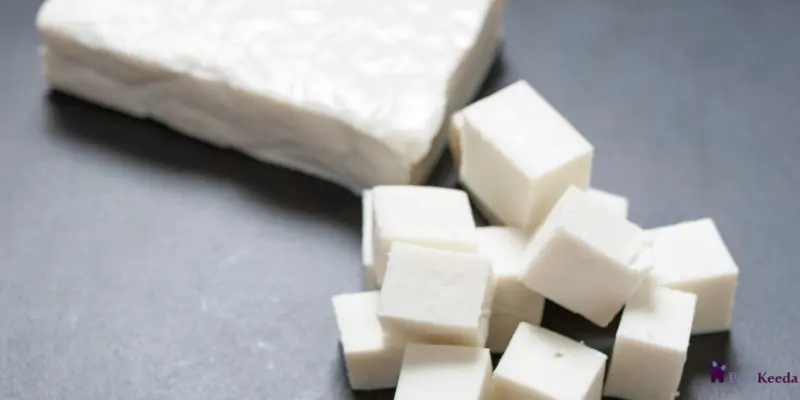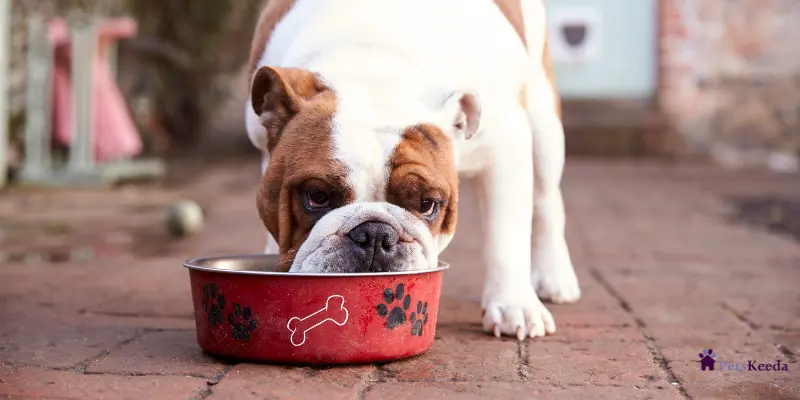Table of Contents
Everyone says that dogs are the best friends of humans and are the most excited before dinner time is announced. They remember each delicious food they have eaten and liked. As a human, it is our responsibility to take care of our pet’s interests combined with the fact that we should also be conscious of the impact on their nutritional requirements and health risks. In this comprehensive guide, we are on a journey to answer the question: Can dogs eat paneer?
Can Dogs Eat Paneer?
Yes, dogs can eat paneer in moderation. It’s important that the paneer is plain, without added spices or salt, as these can be harmful to dogs. Also, keep in mind that some dogs might be lactose intolerant, so it’s best to introduce paneer in small amounts to see how your dog reacts.
Introduction
The first important thing is that you are clear about paneer and its popularity. Compared to other foods, poultry is a significant ingredient in South Asian meals. It is the primary food because it is welcomed all over the world.
Paneer, which originates from milk from the heating process of curdling, draining, and pressing, does not only have a taste that goes with its texture, but it also makes it possible a multi-purpose food can be either used in savory or sweet dishes.
One might wonder, “Can Dogs Eat Paneer?” considering its perfectly creamy consistency and gentle flavor that lets it extend its range of consumers. It makes it a must-have treat for the gourmet lovers of different countries.

Can we share our food with dogs?
It wasn’t the tempting smells from inside the kitchen and the click of the pan that kept the dog behind the door but instead the sizzle of the cookware on the stove. The dog’s owner wants to know if they can share their food with dogs or not. Well, you can, but before that, it is essential to research to know the effects of these foods on your dog’s health.
Culinary versatility and cultural significance
To the world of cooking, the paneer is like a vast blank canvas on which spices, herbs, and sauces are added to produce a lot of mouthwatering recipes. Whether it’s a creamy curry or the tastiest tikka masala, paneer is a versatile food ingredient, and it always finds a place at the table of any festive occasion; on top of that, it carries the cultural meaning of hospitality, celebration, and professional heritage of the art of cooking across the generations.
Also Read: Can Dogs Eat Pomelo?
Can Dogs Eat Paneer?
After all, being responsible pet parents, it is necessary to consider the nutritional implications of feeding paneer to our dog’s diet. Dogs typically grow well on a diet with a high animal-protein ratio, but they have this incredible ability to eat other foods, including fresh cheese such as paneer.
Nevertheless, the important thing is to temper it with the understanding of the impacts on their health at large. This raises the question, “Can Dogs Eat Paneer?” and whether its inclusion could be beneficial or detrimental.

Considerations for feeding paneer to dogs
With paneer to our pets being served as our number one priority, it’s time to look at a few things first. These include the dog’s age, size, breed, health status, and sensitivity to diet.
Moreover, we need to establish the nutritional information of paneer as well as the amount of protein, fat, and calcium it has in order to know if it is a dietary supplement or should be eaten occasionally.
Nutritional Value of Paneer
A paneer contains vitamins, minerals, and nutrients that are essential for humans and dogs. Foremost among these are:
Protein content
Protein functions as the bricks that make the base of life, helping in muscle growth, tissue repair, and general development. Paneer is rich in protein, which is so essential for dog’s food because it strengthens their muscles, especially those dogs that are weakened or suffer from muscle injuries.
Fat content
However, even the fat, which is often called wrong, is essential for its role as a source of energy, a supporter of cell function, and for the absorption of fat-soluble vitamins. Paneer, due to its medium level of fat, can be helpful for dogs that aggressively act; they need fat to fuel them for a long time when chasing things.
Calcium content
Calcium, which is famous for its bone health roles, also acts as a neurotransmitter controller and creates muscle function and blood clotting. The dog food that contains paneer provides the dog with enough bone strength and nutrients to keep it healthy.
The Paneer Diet for Dogs and Its Potential Risks
Something like we humans are different in dairy, the primary simple sugar found in milk, people have different abilities to tolerate lactose. Generally, some dogs can consume paneer without any problem, but others might fail to accept it, which can lead to gastric discomfort symptoms like diarrhea, flatulence, or bloating.
On several occasions, too much consumption of dairy may trigger flatulence. It should be carefully monitored; hence, their diet should be adapted based on how they respond to avoid any side effects or digestive upsets.
Allergic reactions and sensitivities
Similar to the way humans suffer from allergies to some foodstuffs, dogs may end up being hypersensitive to milk products like paneer. Signs can range all the way from mild irritation and itching of the skin to even severe responses encompassing breathing problems or problems with the digestive area.
Also, It’s necessary to keep an eye on any signs of allergic reactions so that you can stop feeding paneer to dogs that have allergies.

Pancreatitis likelihood and the contribution of a Diet rich in fat
Having a dog on feverishness of paneer may be one of the pancreatitis-causing factors. This condition can be dangerous for compromised dogs with a painful pancreas.
Having a high-fat diet can make digestive fluctuations worse, leading to imbalances in digestive enzymes and insulin production irregularities. Such being the case, it is of prime importance to take measures like moderation and caution when making paneer an essential food item in a dog’s diet.
Safe Alternatives for Dogs
If you’re hesitant about feeding paneer to your dog, consider these alternative options:
Lean protein sources
Meats from lean portions like chicken, turkey, or lean cuts of beef have the suitable amino acids that can help dogs build and repair body muscles without much of the burden that’s associated with digesting dairy products.
Calcium-rich alternatives
Calcium-rich foods such as spinach, kelp, sardines, or commercially fortified dog foods should be included in their diet.
Paneer introduction to dogs – how it should be done
Gradual introduction and monitoring
An initial step to include paneer or any new food item into your dog’s diet is to take a slow and steady approach. One possible method of initiating the feeding process is by using tiny portions of the medicated food as a reward or mixing it with the dog’s regular food.
Note any potentially adverse reactions or other conditions affecting the digestive tract, including abnormal stool and digestive problems such as diarrhea, vomiting, or disturbances in stool consistency. The trial can be safe and effective if well-tolerated at the current serving size.
Spend enough time examining your dog’s behavior and physical responses following the consumption of paneer. Identify the situation if you notice symptoms that might be discomfort, allergies, or changes in eating.

Make sure to observe your dog for any adverse reactions, and if you do, discontinue feeding this food product and take your dog to the veterinarian for the next step. It is worth highlighting the fact that each dog is different and, therefore, their diet needs to be specifically adapted to their unique traits or preferences.
Frequently Asked Questions
Q1. Can dogs be lactose intolerant?
Ans: Yes, a dog may be lactose intolerant in the sense that he cannot digest lactose properly because of the lack of enzyme lactase, which is a reason for breaking down the lactose molecule, leading to many digestive problems and discomforts of such a type.
Q2. What are some signs of lactose intolerance in dogs?
Ans: Lactose intolerance demonstrations in dogs may vary from diarrhea to vomiting or bloating of the abdomen and a lot of burping after eating dairy products.
Q3. Can paneer cause pancreatitis in dogs?
Ans: Feeding Paneer only occasionally and in the least volumes possible can lower the chances of pancreatitis, an acute and potentially fatal inflammation in susceptible dogs.
Q4. Is cottage cheese beneficial for dogs?
Ans: Yes, in some cases, specific types of cheese, including Cottage cheese or low lactose variants, may be acceptable and good for dogs.
Q5. Is paneer good for the health of dogs?
Ans: Yes, paneers include a lot of nutrients that are essential for dogs’ health, but some dogs can be allergic to them, and consuming a large amount can cause many problems.
Conclusion
Overall, paneers definitely can be tempting food for our dogs, so the answer to the question, can dogs eat paneer? is yes. Still, one should always stick to a cautious and reserve-minded attitude regarding its addition to their diet.
As long as it is not toxic by its nature, paneers can cause digestive upset, allergies, and, although very rarely, pancreatitis if it is provided inconsistently or in large amounts. Firstly, you need to know whether paneer suits your dog’s nutrition, if it is allergenic for them, or whether it could have a negative impact on their health.
Take into account a variety of lean protein-based foods and make sure calcium-rich foods are part of the daily diet to pursue optimal health and well-being. Hence, sensible decision-making concerning pet food is the vital component of responsible ownership of your dog, and its health is the ultimate goal.

